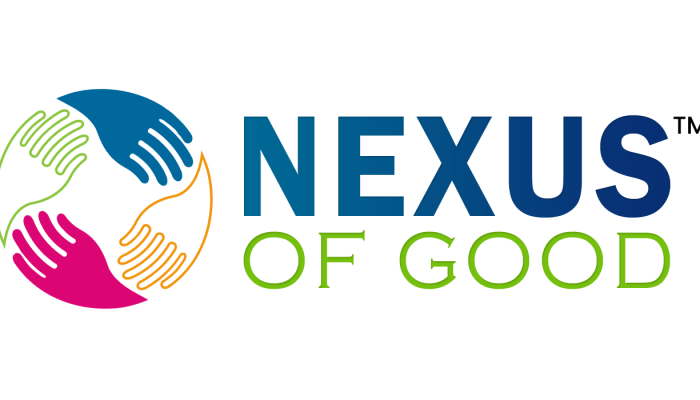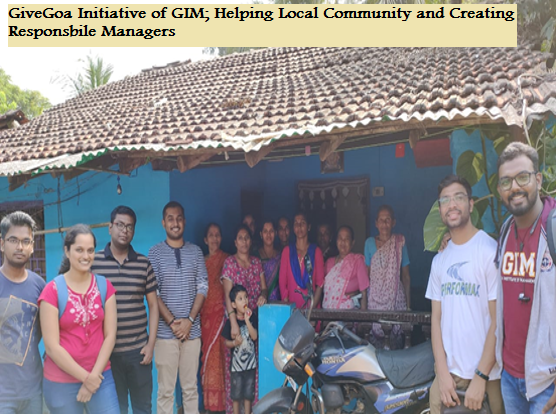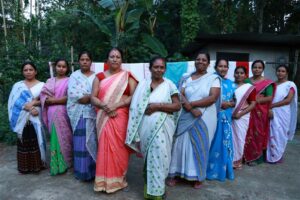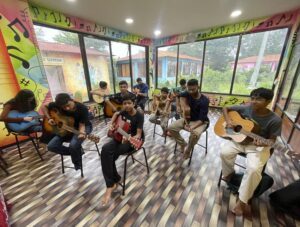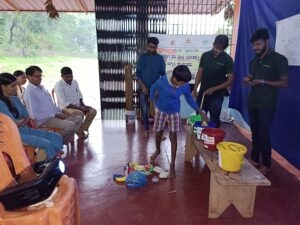GiveGoa initiative (part of Social Responsibility and Action) was started in July 2011 in response to several trends, both internal and external to Goa Institute of Management (GIM). On one hand, it arose out of society’s concern about the social responsibility of business and on the other hand it wanted to prepare responsible managers. As greater consensus about the social responsibility of business emerged, Business schools needed to promote social responsibility among the managerial workforce. Within GIM, our educational philosophy has always emphasized the development of socially responsible managers. The recent business scandals acted as a wake-up call for business schools in general and GIM in particular. The Governing Board of GIM felt it was time to emphasize social responsibility through the curriculum, towards preparing more responsible managers.
Objective and Operationalization
The purpose of the GiveGoa initiative is to promote social responsibility among the students of GIM through service to the less privileged communities and contributing to make society more inclusive. It is operationalized as a compulsory 4-credit course in the first year of the PGDM program. The course has two components: 3-credit experiential project with partner organizations (such as banks and NGOs) and 1-credit classroom learning experience. The institute chose to make the course compulsory and assign credits for two reasons: 1. The goal of creating socially responsible managers required all students to be provided with opportunities that can make them contibute and 2. Highlighting the importance of the course to motivate students to expend effort. If the course is not made mandatory for the students, the lack of motivation among students could adversely affect the institute’s reputation among stakeholders.
Service-Learning Pedagogy
The experience of taking responsibility for others and reflecting on the experience are essential for inculcating responsible behavior. Therefore, the course includes (a) an action-component, where students learn through service to the community, and (b) a reflection component. The learning from the projects is reinforced through classroom discussions of films and articles on responsibility. Students of the first year of the Post Graduate Program are formed into groups of six to undertake a project at an organization in Goa. They visit one of twenty client organizations, every Thursday for 20 Thursdays. Each group is guided by a faculty member and by a project coordinator in the client organization.
How was this initiative executed
GiveGoa coordination team approaches organizations (clients) such as banks and NGOs every year with the purpose of collaboration to provide students with projects. The projects broadly address client concerns and offer an opportunity for students to work with disadvantaged sections. Projects are taken up broadly in the fields of Education, Social Welfare, Agriculture extension and Public Health. They are finalized, based on inputs from the CSR coordination team, the client organizations, and the students of GIM. GiveGoa coordination team continously work on offering students about 43-50 projects at the beginning of the year. Student-groups initially indicate their top three preferences from the projects on offer. Groups are guided by faculty members from GIM and mentors from the partner organizations. Faculty members, the partnering organizations and team-mates play a role in monitoring and evaluating performance. Progress is regularly monitored through weekly discussions and progress reports. An essential requirement of the project is that student-groups reflect on and document their experiences and outcomes.
Learning Goals
The purpose of the GiveGoa project is to promote social responsibility for the less privileged communities and thereby contribute to a more inclusive society. The project aims to help students become more socially aware and inclined towards taking responsibility for the community welfare. The project aims to enable students to:
- describe “real-world” problems and circumstances faced by the community
- help them to implement changes that improve the livelihoods or lives of the community
- realize the need for (and feel inclined towards) addressing problems of the community
In last nine years projects were taken up broadly in the field of education, agriculture, environment protection, awareness regarding various government schemes and health etc.
Community development initiatives |
GIM’s contributionImproving access of poorer sections to financial inclusion schemes, government schemes and fina-schemes (Banks, NABARD, Dairy Department) created awareness among farmers/ self-help groups/ vegetable vendors/ school students about government- and bank-schemes for them. It helped farmers form joint-liability groups to avail of government subsidies/ bank loans despite not having land titles.
Improving quality of education among government schools in rural areas (Directorate of Education, Sarva Shiksha Abhiyan) and conducted workshops for teachers on use of internet to obtain useful teaching resources supported them by coaching children in maths and English.
Improving sustainability and effectiveness of NGOs (El-Shaddai, SPACE, COOJ, CRG, VHAG) and organise activities to promote awareness about the NGO among the local community. Supported NGOs by teaching drop-outs who had registered with the NGOs for coaching and helped in advancing the NGO’s agenda.
Improving agricultural productivity through better linkages (Zonal Agricultural Office, Directorate of Agriculture) | Conducted workshops to educate farmers about need for soil-testing, about what pesticides/ fertilizers to use and developed soil maps for villages/ sections of villages and handed these to the panchayat. They have also conducted workshops about how to use the results of soil-tests (in deciding what fertilizer/ pesticide to use, what to grow). These workshops were in association with the relevant Govt dept., the ICAR and business
Creating awareness amongst local community regarding water conservation, protection of water resources for a sustainable future and waste management (Panjim Municipal corporation, Pollution Control Board, Nestle, VHAG). They have conducted seminars in local villages and addressed schools students about the need of conserving water. An initiative of mapping the water resources in 5 villages and identifying leakages has also been processed which has helped fixed these leakages. Assessment of Bio-toilet facility in Quepem taluka, Need Assessment in Panaji slumsNeed Analysis on Dry Waste Management in Valpoi, Awareness seminars in various villages. They have created awareness about Health related issues among Goan community and created knowledge about flagship programs like ‘Arogya Mitra’ and ‘Arogya Express’. Conducted Health camps for children in Baga , Candolim along with PHC support. They surveyed for assessment of health care provider services (Demand and Supply side) for PHC’s and sub-centres in North Goa and conducted awareness workshops and educational activities on health for children studying in bastis of North Goa and lifestyle diseases like hypertension and diabetes.
